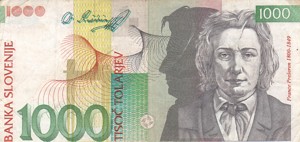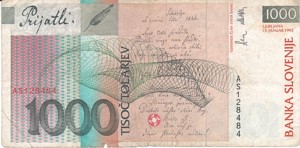The Literary Traveler
an ongoing series by Thomas E. Kennedy and Walter Cummins
![]()
A LITTLE WREATH OF SONNETS FOR
FRANCÉ PRESEREN (1800-49)
by Thomas E. Kennedy
On a recent visit to Ljubljana I had the good fortune to acquire a book of poetry by Francé Preseren in English translation. it is in fact the only book of poetry he wrote in Slovenian—a language which at that time was not considered fit for poetry or for anything other than merchant's patter. German was the language of the ruling Austro-Hungarian Empire and the tongue of the upper classes and poets.
But Preseren was loyal to his own Slovenian language, and the single book of poems he published in Slovenian though critically unrecognized during his lifetime would later earn him recognition as the Slovenian national poet, one of his poems even serving as the text of the national anthem.
"A Little Wreath of Sonnets" is a small tribute to the poet's "A Wreath of Sonnets" (1833), a group of fifteen sonnets woven through rhyme and line repetition into a wreath for a woman he loved; the first letter of the first line of the last five sonnets and of the last five lines of the last sonnet spell out the name of his beloved, Julia. This was viewed as scandalous at the time and caused Preseren great social and professional difficulties for the remainder of his life. That he dared to name her openly in this manner evoked the wrath of her family and perhaps herself as they considered him below their status and saw to it that he was shunned by Ljubjana (the Slovenian capital) society. A lawyer by profession he was never able to establish an independent practice until the end of his life and died in poverty.
I found this story fascinating and as I wandered the streets of Ljubljana those days I found the desire to celebrate Preseren with a wreath of sonnets of his own would not give me peace until I had accomplished it. I did so in the course of walking through the city, stopping frequently in a cafe here and there along the bank of the Ljubjanica to compose
Here then is my little wreath of sonnets for Francé Preseren The notes explain the names and background touched upon in the sonnets. These sonnets use Preseren's end-line scheme--a celebration of the vowels; the lines end in a progression of a-e-i-o-u sounds, with the last quatrain of each sonnet doing double vowel rhymes.
1.
Burn these ungrammatic words, said Kopita,
And those young poems you burned, for pedantry.
He was your learned friend, you thought, but I,
Oh! Into the flame, thoughts' fingers go.
Nine score years too late I ask, How could you?
But you had yet to find good Mateja
Cop, or yet The Carniolan Bell,
To give you strength against Jernej's pale eye
And let your people their own tongue know
As more than market prattle, something new:
Slovenian poems,not German, pesmi,
The language of a people long ago
Yoked beneath the tongues of those who occupied,
Until your songs, thought dead, they came to know.
Notes
2.
Francé wove a wreath for Julia
Rejected hard by her fair family.
A Toast, To the Poet, A Wreath of Sonnets I
Now weave for you, France, lift my pivo,
Cheers, France, crossing Dragon Bridge to you,
Ever singing spirit of Slovene Café.
Preseren, pesmi, pivo, longing free
Rider of the tribe of Trubar, Slovene fire,
Early spaded, early moss there did grow.
Sleep well now, gentle singer. Pain for you
Early slept as well. But not breath, Francé,
Rising still in Slovene song and cheer,
Echoing from out your one book's lines,
No more, just one, yet you will never die.
Notes
3.
There you stand above the Ljubjanica,
Laureled at last for all Slovenes to see.
Preseren, you worked at law; you sang your cries,
You breathed her name for all to hear, but no
Love from her high eyes shone down on you.
The lofty people of that Julia
Ensured success would never for you living be.
A bright wreath of sonnets in love you tied
For a woman who thought you far below
Her high German. To your tongue you were true.
In hope, in dread, far from the cheer of Urba,
You plied that lonely joy, sang your agony.
Now you stand above the Ljubjanica,
Laureled at last for all Slovenes to see.
Notes

Sculpture of Francé Preseren (1800-1849), Slovenian national poet. The Slovenes settled in their land in the sixth century A.D. and the land was occupied, their language suppressed, almost continuously by various invaders until 1991 when Sloveniar independence was won. Preseren was the first poet to write it the Slovenian language, which had been considered an inferior tongue. His "Wreath of Sonnets," dedicated to a woman of higher social status whom he loved, created a scandal which resulted in his being shunned by polite Slovenian society. Although popular during his life, only after his death was his poetry truly honored. His statue now stands on Preseren Square above the Ljubjanica River, running through Ljubljana, the capital of this country of two million people, a former sub-state of Yugoslavia, in the south eastern Alps on the Adriatic Sea. The sculpture has been erected facing the balcony of where his beloved Julia's apartments were.

Legend has it that Ljubljana was founded by Jason and his Argonauts and that Jason slayed a dragon which is now depicted in the Slovenian coat of arms. This is one of the four dragon sculptures at the entrances to the Dragon Bridge spanning the Ljubjanica, just down from Preseren's memorial.


Perhaps the supreme irony, as so often is the case in Europe, great writers—not all of whom enjoyed a welcome social status in their countries when they lived—later are honored with their portraits on national currency. This has been the case with James Joyce on the Irish ten pound note together with the opening sentence of Finnegans Wake, with Charles Dickens on the British ten pound note, with Hans Christian Andersen on an earlier ten crown note and Karen Blixen (Isak Dinesen) on the current fifty crown note in Denmark, Antoine de Saint-Exupéry on the French fifty franc note, and France Preseren on the current thousand note, along with a quill and—on the obverse—the opening lines of his poem, "A Toast," which would become the Slovenian national anthem. Perhaps one day Henry Miller will adorn an American bank note.